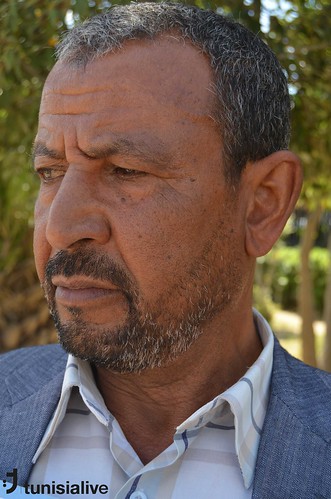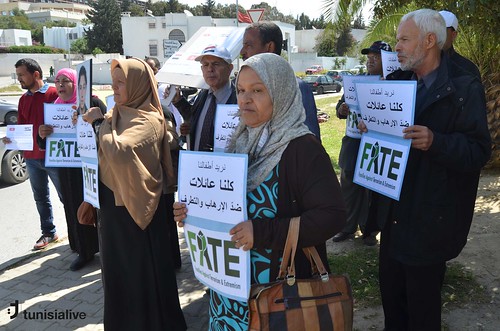He was, he told his parents, in hell.
Like his father, Ahmed had worked on the farms around Bizerte. Majid remembers a normal boy, no more, no less religious than his family or any of the other young men from the area. However, five years ago for reasons Majid still can’t understand, he left to fight Jihad in Syria. Now his Mother can barely leave the bed. She simply sits and cries. Majid’s only remaining ambition is to see his son one more time before he dies.
The international security agency, The Soufan Group has calculated that between 27,000 and 31,000 people have traveled to Syria and Iraq to join the Islamic State and other violent extremist groups. According to the same source, in October 2015, approximately 6,000 of those were Tunisian.
Few of the parents protesting outside the Ministry of Foreign Affairs talk about religion in any way other that countless families do throughout Tunisia. Any of these families could be anyone. However, all speak of losing their children twice; firstly to a belief system as alien to their own as any from anywhere in the world and, secondly to the killing fields of Iraq, Syria and, most recently, Libya.
43 sons of the families now demonstrating outside the Ministry in Tunis didn’t make it much further into Syria than the Turkish border. Most were arrested on arrival, imprisoned and have since served as unwitting pawns in a diplomatic chess game between Syria and Tunisia. None of the parents outside the Ministry are calling for their children to go unpunished, only that they should take responsibility for their actions within their homeland.
Sami Kamel Ben Achour’s story is typical. Sami was arrested on the Syrian border on 28 March 2012. His parents managed to visit him in Syria later that year. “People were nice.” His father, Mehriz, recalled, “They were helpful. My wife went on TV and begged for forgiveness. Eventually, we met with a Minister who said Sami could come home.”
The only condition attached to Sami’s release, and that of the other 42, was that it be negotiated by an accredited member of the Tunisian government. However, with diplomatic relations severed in February by former President Moncef Marzouki, it was a condition Syrian officials likely knew Tunisia would be able to meet.
However, following the resumption of relations between the two countries in April of last year hopes had been high that the 43 might return. However, nearly twelve months and countless promises later, there is still scant cause for optimism.
His hands shaking, Mehriz brandishes a letter from the Doctor. He says it certifies that the four year wait has made him “crazy.” An hour earlier, he had emptied out his medications onto the hot tarmac outside the Ministry’s gate, as impassive guards watched him unbundle the blankets he said he would sleep under until his son was returned.
51 year old Fathia Blé from Citte Ettadhamen is here for her son, Houssem. He had told his parents that he was going to Libya to look for work; his previous job at a city clinic had barely covered the cost of the daily commute. Fathia didn’t hear from Houssem again until, watching television one night with her family, her son’s name appeared amongst those being held in Damascus. Fathia feinted. In June 2013, along with some of the other parents, Fathia managed to travel to the Syrian capital to see her son. “He was in a horrible state. They were underground. I still don’t know if they’re feeding them. They’re at war, so I don’t know if they would feed prisoners.”
“He was a normal boy. He wasn’t religious. I don’t know how this happened.”
The parents of the 43 have maintained contact through the Rescue Association for Tunisians Trapped Abroad, (RATTA) which serves as a sometimes uncomfortable liaison between the families of those who have left for war in Syria, Iraq and Libya and the authorities and security services in Tunisia. Today, the association is acting in concert with the international grouping, Fate, (Families Against Terrorism and Extremism). The Association’s Tunisian President, Mohamed Iqbel Ben Rejeb has experience in these matters. His paraplegic brother left for Syria in 2013, spending his 24th birthday in a Jabhat al Nusra training camp. Miraculously, the family negotiated his return.
Together with Fathia, Ben Rejeb leaves the protest to deliver a letter to the President, Beji Caid Essebsi asking that he intervene in the case of the families’ 43 missing sons. They get as far as the gate and hand over the letter to officials there. Phone calls are made. They are told a meeting will be scheduled.
The families prepare to wait.
Mohamed Iqbel Ben Rejeb, accompanied by one of the prisoner’s mothers, delivers their letter to the Presidentg. Photo Credit: Simon Speakman Cordall
 English
English Français
Français العربية
العربية app
app




